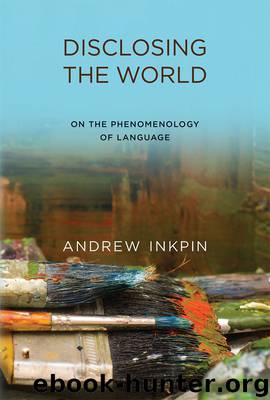Disclosing the World by Andrew Inkpin

Author:Andrew Inkpin [MIT Digital Book Services]
Language: eng
Format: epub
ISBN: 9780262033916
Publisher: The MIT Press
Published: 2016-03-14T18:22:28+00:00
2 Language-Games
The intrinsic link between the use of language and practice that defines Wittgenstein’s praxeological conception of language is best understood by considering the notion of language-games. Although constantly relied on, and perhaps the most distinctive feature of his thinking from 1935 onward, Wittgenstein’s characterizations of language-games are terse and somewhat vague. In the earliest of these, in the Blue Book from 1933 to 1934, language-games are introduced as “ways of using signs simpler than those in which we use the signs of our highly complicated everyday language”; they are “primitive” or “simple forms of language,” from which “we can build up the complicated forms … by gradually adding new forms.”16
In PU the term language-game is introduced, in §7, against the background of an example of a “system of communication,” or “complete primitive language,” used to coordinate work on a building site (§§3, 2). Repeating a claim made in both the Blue and Brown Books, Wittgenstein goes on to suggest that it is through such simple “games” that children first acquire language.17 The term language-game is then introduced as applying to “those games by means of which children learn their mother tongue,” including simple rote-learning drills and “primitive languages.” Further explication comes in §23 with a sizable list of examples of language-games such as giving orders, describing the appearance of objects, inventing stories, telling jokes, translation, and so on. Finally, in both these passages Wittgenstein highlights that language-games concern “the whole process of using words,” “the whole: of language and of the activities with which it is interwoven” (§7). Indeed, the expression “language-game” is intended to convey precisely that “the speaking of language is part of an activity, or of a form of life” (§23).
To understand what is important about the idea of language-games, it will be instructive to proceed by considering three apparent problems. First, it is strange that Wittgenstein links language-games with children’s acquisition of language. Not only does this look like an (uncharacteristically) empirical claim—for which Wittgenstein offers no evidence—but it is far from obviously true that the examples of §23 are in any way specific to, and in some cases even part of, children’s learning of language. Understandably perhaps, Baker and Hacker (1980, 52) claim that by the time of PU, Wittgenstein had rejected the idea of an “analytic-genetic” connection between language-games and language acquisition. However, the textual evidence is far from clear, with both §5 and §7 talking as though such a connection exists.18 Nonetheless, what does seem beyond question is that becoming a competent language user involves acquiring the ability to participate in the various kinds of practice Wittgenstein enumerates in §23, examples that do not in any way reflect the specificity of (children’s) learning situations. It therefore seems that Baker and Hacker’s intuition is correct and that, despite the way Wittgenstein presents it, the idea of language-games does not require any specific link with language-acquisition scenarios. The point Wittgenstein is making, somewhat misleadingly, in talking of language acquisition is thus best taken as
Download
This site does not store any files on its server. We only index and link to content provided by other sites. Please contact the content providers to delete copyright contents if any and email us, we'll remove relevant links or contents immediately.
The Art of Thinking Clearly by Rolf Dobelli(8842)
Mindhunter: Inside the FBI's Elite Serial Crime Unit by John E. Douglas & Mark Olshaker(7834)
Change Your Questions, Change Your Life by Marilee Adams(6641)
Nudge - Improving Decisions about Health, Wealth, and Happiness by Thaler Sunstein(6633)
Mastermind: How to Think Like Sherlock Holmes by Maria Konnikova(6236)
The Power of Now: A Guide to Spiritual Enlightenment by Eckhart Tolle(4756)
Men In Love by Nancy Friday(4327)
Factfulness: Ten Reasons We're Wrong About the World – and Why Things Are Better Than You Think by Hans Rosling(4022)
The Confidence Code by Katty Kay(3566)
Thinking in Bets by Annie Duke(3531)
Man and His Symbols by Carl Gustav Jung(3315)
Three Women by Lisa Taddeo(2920)
The Worm at the Core by Sheldon Solomon(2918)
Why Buddhism is True by Robert Wright(2827)
Liar's Poker by Michael Lewis(2812)
The Inner Life of Animals by Peter Wohlleben(2766)
Descartes' Error by Antonio Damasio(2732)
The Power of Mindful Learning by Ellen J. Langer(2710)
The Slow Fix: Solve Problems, Work Smarter, and Live Better In a World Addicted to Speed by Carl Honore(2574)
